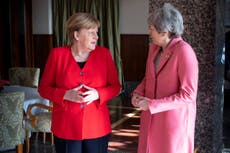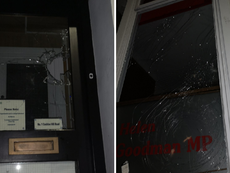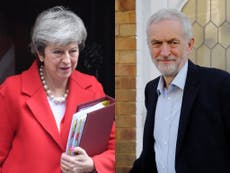Don’t fear European Parliament elections – they could help drain the Brexit swamp of UK politics
The million who marched in London for a new referendum or the six million who signed the Revoke Article 50 petition will have a chance to vote for what they want

Whatever comes of Theresa May’s footsie with Jeremy Corbyn, it is hard to see how she avoids asking the EU for an extension of the Article 50 in the hope that one day, over the rainbow, a majority will appear for her thrice-rejected deal.
The EU has made it clear that any extension means Britain taking part in the European Parliament elections. It is legally impossible for the EU27 and the Commission to do otherwise.
So here local authorities have been instructed to prepare. Parties have started choosing candidates. Labour has emailed all its members asking anyone to nominate themselves for the 54 MEP candidate vacancies Labour needs to fill – and fast.
The switch to proportional representation for these EP elections in 1999 was the moment when Ukip and Nigel Farage entered UK political history, taking just 15 years to emerge as the biggest party in 2014.
But the paradox of Brexit is that the same PR system can help to deliver a breakthrough for a new post-Brexit politics. EP elections will be the first moment when the TIG breakaway MPs headed by Heidi Allen, Chuka Umunna and Anna Soubry – now rebadged Change UK – can put up a nationwide slate of candidates and see what support they have.
The million who marched in London for a new referendum or the six million who signed the Revoke Article 50 petition will have a chance to vote for what they want – a politics that rejects the flawed 2016 plebiscite when just 37 per cent of the total electorate voted to quit Europe.
Both the Conservatives and Labour remain wedded to backing the Brexit referendum outcome and maintained that position in their election manifestos in 2017.
Labour remain ambiguous, to put it mildly, on a new referendum. But Labour does reject membership of the single market and appears to support May’s stringent new immigration bureaucracy on EU citizens who seek to work or live in Britain.
So in the EP election, the Tories, Labour, Ukip and Nigel Farage’s new party will represent the pro-Brexit camp.
The LibDems may hope to pick up the anti-Brexit votes but have not so far scored well in either the 2017 general election, by-elections or in municipal elections. The LibDem Knights – Sir Vince Cable and Sir Nick Clegg – are still associated by many, especially younger voters, with the austerity ideology of 2010-15 and above all the massive hike in student fees. Sir Vince and Sir Nick also refused to challenge David Cameron’s Brexit plebiscite.
The advantages of a proportional representation system is that it allows both the new Change UK party, the LibDems, Plaid Cymru and Greens to win votes from anyone unhappy with the Brexit line of the Tories and Labour, let alone Nigel Farage and a Ukip which is now associated with Tommy Robinson and the far-right of the EDL and other racist, xenophobic anti-Europeans.
In England and Wales it would be better if pro-European parties could field a common list but even if they stand separately they can do well under a PR system.
In Scotland, the anti-Brexit SNP should scoop the pool. In the Newport by-election which Labour held on a much reduced vote and with a swing to the Tories, the combined pro-Remain, pro-new referendum votes was twice that of Ukip as polling expert John Curtice has pointed out.
The chancellor Philip Hammond has hinted that May could agree to take part in the EP elections to win more time, and then cancel them on 22 May, the day before they take place. Even by the standards of “Perfidious Albion” such cynicism on the part of government would produce a serious backlash.
So stand by for European Parliament elections which, as with the rise of Ukip 15 years ago, could see a new politics emerge from the swamp of Brexit anti-Europeanism.







Join our commenting forum
Join thought-provoking conversations, follow other Independent readers and see their replies